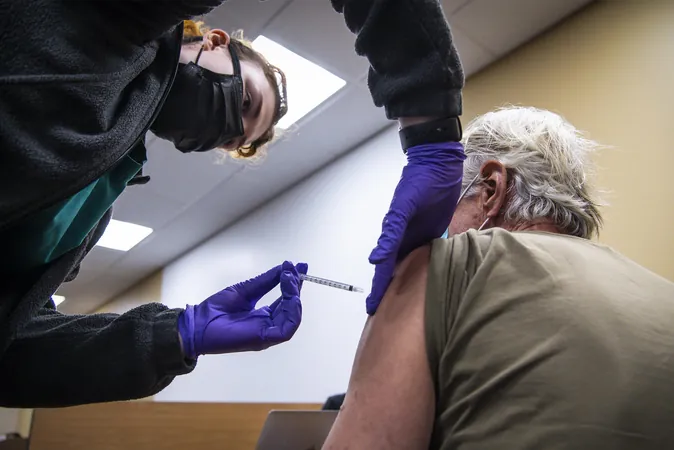
Vermont Navigates Confusion Over Covid Vaccine Access Amid New Federal Rules
2025-09-09
Author: Ling
Navigating New Terrain: Vermont's Vaccine Access in Flux
As the chill of cold and flu season looms, Vermonters are facing uncertainty regarding Covid-19 booster shots due to recently tightened federal regulations. Despite these changes, many residents are still eligible for the vaccine, but questions around Medicare reimbursement and federal guidelines persist.
In a recent announcement, Health and Human Services Secretary Robert F. Kennedy Jr. shared that the FDA has approved Covid-19 booster shots, but only for individuals aged 65 and older or those with specified health risks. This new directive casts doubt on the availability of vaccines for the broader population.
CDC Recommendations Are Key
State officials are now awaiting input from the CDC, which typically influences public health measures and insurance coverage for vaccinations. Julie Arel, Vermont’s interim health commissioner, advised residents to either set up online appointments or contact local pharmacies to see if the vaccines are in stock.
Pharmacies Stepping Up to the Plate
Local pharmacies, including Kinney Drugs and CVS, are moving forward with distributing the latest Covid vaccines. These pharmacies place orders directly with manufacturers, while healthcare providers like doctors’ offices generally receive their supplies through state channels that have yet to access CDC stock.
Kinney Drugs spokesperson Alice Maggiore confirmed that they are authorized to administer vaccines to individuals aged 65 and older as well as those between 12 and 64 who meet qualifying health conditions. Similarly, CVS is prepared to vaccinate anyone over 5 years old who fits the eligibility criteria outlined by the CDC, without the need for a doctor’s prescription.
Insurance Confusion Adds to the Frustration
Coverage for vaccines traditionally falls under insurance policies, yet the landscape is murky. Blue Cross Blue Shield of Vermont is set to cover vaccines at no cost for its members through 2026, while MVP, another major insurer, plans to maintain its current coverage policies. However, the stance of employer-sponsored plans and military health systems like Tricare remains uncertain.
With the FDA’s approval for those over 65, it is anticipated that Medicare will also cover these vaccines, as explained by vaccine policy expert Dorit Reiss. The process involves approval from the FDA, followed by a recommendation from the CDC's Advisory Committee on Immunization Practices (ACIP), with a critical meeting scheduled for Sept. 18-19.
Seeking Clarity in Uncertain Times
The lack of formal guidance on qualifying conditions from the FDA could lead to confusion among both providers and patients. Arel expressed concerns that this ambiguity might hinder immunization rates, emphasizing the need for clear and straightforward communication.
To ease hurdles, the Vermont Department of Health is collaborating with neighboring states to establish a cohesive response to shifting federal guidelines. Arel noted that achieving alignment across the Northeast could enhance public confidence in health department actions.
Learning from Neighboring States
In Massachusetts, for instance, the governor mandated that in-state insurers cover vaccines recommended by the Department of Public Health, regardless of federal recommendations. This proactive approach serves as a valuable model for Vermont, which is keen to explore similar strategies.
"Having a clear, simple message is vital as we navigate these challenges," Arel stated. As the landscape evolves, Vermont officials are committed to ensuring residents receive the necessary guidance and access to Covid-19 vaccines.


 Brasil (PT)
Brasil (PT)
 Canada (EN)
Canada (EN)
 Chile (ES)
Chile (ES)
 Česko (CS)
Česko (CS)
 대한민국 (KO)
대한민국 (KO)
 España (ES)
España (ES)
 France (FR)
France (FR)
 Hong Kong (EN)
Hong Kong (EN)
 Italia (IT)
Italia (IT)
 日本 (JA)
日本 (JA)
 Magyarország (HU)
Magyarország (HU)
 Norge (NO)
Norge (NO)
 Polska (PL)
Polska (PL)
 Schweiz (DE)
Schweiz (DE)
 Singapore (EN)
Singapore (EN)
 Sverige (SV)
Sverige (SV)
 Suomi (FI)
Suomi (FI)
 Türkiye (TR)
Türkiye (TR)
 الإمارات العربية المتحدة (AR)
الإمارات العربية المتحدة (AR)